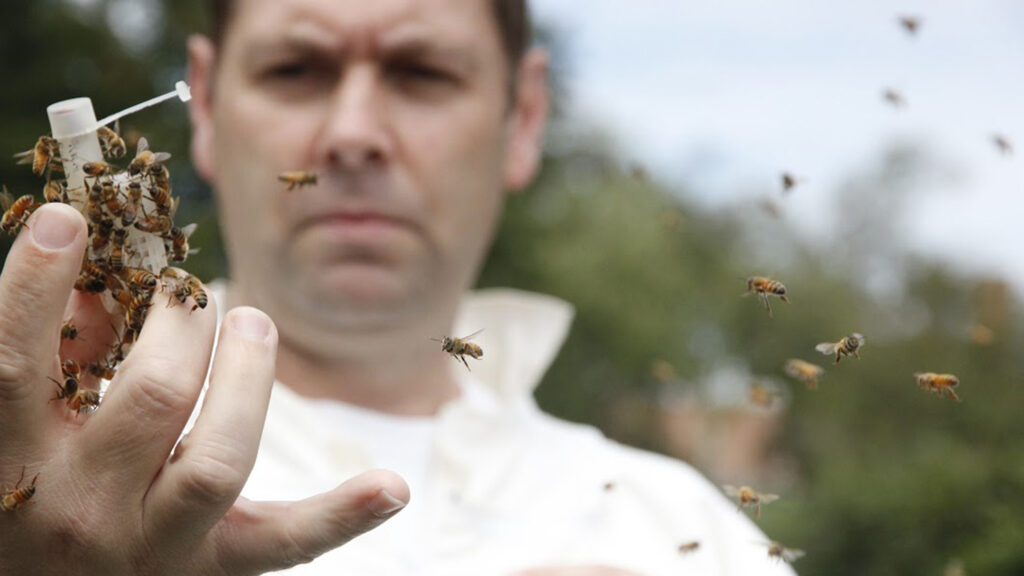The Bee Lab
The NC State Apiculture Program
The NC State apiculture program, also known as the Bee Lab, focuses on furthering an understanding of honey bee biology and improving bee management. Dr. David Tarpy and his lab conduct research on colony health and productivity, and through NC State Extension, are able to relay this information to beekeepers and the agricultural community. Extension services help support industry and hobbyist beekeepers through a number of resources, including educational clinics, pathogen screening and genotyping, as well as measuring the overall quality of colony health and productivity.
The research conducted by Dr. Tarpy and his lab not only benefits beekeepers in North Carolina but has a national audience as well. Through partnerships with apiculture science programs and universities across the United States, research can be conducted in, and data can be collected from, a number of real-world settings that help provide information on best practices and disease prevention to beekeepers throughout the nation.
The North Carolina State Beekeepers Association Apiculture Science Initiative
- 2016: The NCSBA embarked on the Apiculture Science Initiative with the objectives to fund a new apiculture research facility, establish an endowed professorship in apiculture and develop ongoing program support.
- 2016: The NCSBA conferred with university officials to conduct a feasibility study and produce a preliminary design of the proposed facility.
- 2017-2021: The NCSBA successfully lobbied the NC General Assembly for $4 million to replace the aged physical facility.
- 2021: Governor Cooper signed into law a budget bill that appropriated $4 million for a new apiculture research facility.
- 2022: Project design began for the new apiculture facility.
- 2022: The NCSBA Board of Directors approved $250,000 to begin fundraising for the North Carolina State Beekeepers Association Distinguished Professor in Apiculture.
- 2024: Groundbreaking for the new apiculture facility has been scheduled for August 2024.
Apiculture at NC State

How the Bee Lab Supports Beekeepers
North Carolina Master Beekeeper Program
Instigated the North Carolina Master Beekeeper program from 1982 until 2011, when the North Carolina State Beekeeper Association took over the program.
North Carolina Master Beekeeper Program
Instigated the North Carolina Master Beekeeper program in 1982 until 2011, when the NCSBA took over the program
NC Africanized Bee Plan
Helped to create, oversee and implement the “NC Africanized Bee Plan” with the North Carolina Department of Agriculture and Consumer Services’ Apiary Services program and offers Africanized Honey Bee testing.
Beekeeper Cost-sharing Program
Conducted the 2005 New Beekeeper Cost-sharing Program, funded by Golden LEAF Foundation, to bolster the honey bee population in the state by helping to attract new people to beekeeping.
Increasing public awareness of Colony Collapse Disorder
Were original participating members of the Colony Collapse Disorder (CCD) Working Group, a consortium of apiculture extension and research scientists formed to define and address the phenomenon of Colony Collapse Disorder. The result has been a profound increase in public awareness about the importance of honey bees and beekeeping due to intense and ongoing media coverage of CCD.
Apiary Science at NC State
Many years of research on apiary science in North Carolina, with a focused concentration on honey bee queens and improving their quality to make colonies more healthy and productive.
“Born and Bred” in NC
In 2010-2011, an initiative the first ‘Born & Bred in NC’ initiative to train beekeepers in queen rearing and bee breeding. The NCSBA and volunteer members are now continuing this effort.
BEES – Beekeeper Education and Engagement System
Manages BEES, the Beekeeper Education and Engagement System, an online system of courses aimed at improving beekeeper knowledge and skills.
Wolfpack Waggle
Publishes the quarterly Wolfpack Waggle newsletter about current projects of the Bee Lab, our latest publications and research findings, and other announcements from the program.
Queen and Disease Clinic
The Bee Lab’s Queen and Disease Clinic tests the reproductive quality of queens and drones, provides standard and apiary pathogen screening to identify disease and parasites, offers mitotyping to identify Africanized Honey bees, and conducts genotyping to identify the genetic diversity of colonies and operations—all to assist beekeepers in making science-based informed decisions about their management to improve their operations.
How to Support The Bee Lab
- Donate directly to the program online.
- Become a member of the “Swarm Collective” and sign up for volunteer opportunities and citizen science projects.
- Follow @NCSUApiculture on Twitter, Facebook, and Instagram and sign up on our email listserv.
- Invite your local officials, state representatives and senators to your local chapter meetings to discuss the importance of honey bees and apiculture science and to secure support for the new facility initiative.